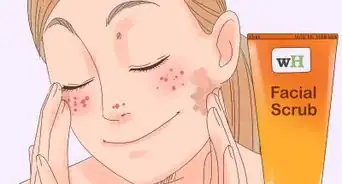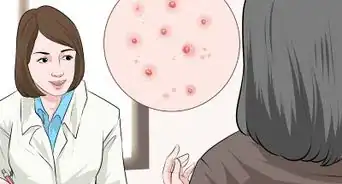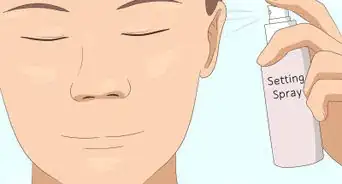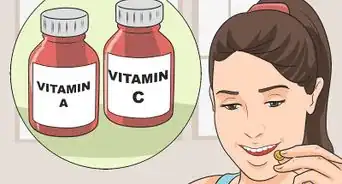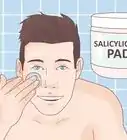This article was co-authored by Laura Marusinec, MD. Dr. Marusinec is a board certified Pediatrician at the Children's Hospital of Wisconsin, where she is on the Clinical Practice Council. She received her M.D. from the Medical College of Wisconsin School of Medicine in 1995 and completed her residency at the Medical College of Wisconsin in Pediatrics in 1998. She is a member of the American Medical Writers Association and the Society for Pediatric Urgent Care.
There are 8 references cited in this article, which can be found at the bottom of the page.
This article has been viewed 68,677 times.
Have you ever walked through the hallway envying that girl with a blemish-free face? It's okay! Almost everybody has. Middle school is the time when girls (and guys) have breakouts. By taking care of your skin, yourself, and your diet you can help eliminate any pimples you might have.
Steps
Taking Care of Your Skin
-
1Consider seeing a dermatologist. In some cases, using the wrong drugstore products can worsen acne; therefore, it might be wise to visit a dermatologist who can help you understand what is causing your acne. He can also recommend products and treatments that you can try to help clear up your skin.[1]
-
2Understand acne fighting ingredients. There are many, many products on the market (face washes, creams, pads, etc.) meant to help fight against acne, and it can be really hard to know which one will work best for you. These usually contain an active ingredient to help fight your acne. If you purchase a cleanser or other product that contains salicylic acid, but it doesn’t seem to be working after a few months of use, then try switching to another acne fighting ingredient.
- Benzoyl peroxide is an ingredient that helps kill bacteria and keep pores clean; however, it is recommended that you use a cleanser that has less than 2.5%. When washing your face, let it sit on the skin for about 15 seconds before rinsing. This way, it will have enough time to penetrate your pores.[2] You can also use pads or leave-on creams with 2.5% to 10% benzoyl peroxide.
- Salicylic acid is another common acne fighting ingredient. It works by helping get rid of dead skin cells on the skin, which often trap bacteria, causing breakouts. Salicylic acid is available in cleansers and other leave-on products.
- Products containing retinoids can help fight acne, especially blackheads and whiteheads. Most retinoids are available by prescription, but you can get some (such as adapalene gel) over-the-counter. Apply retinoids at night as they can make your skin sensitive to the sun, and be aware you may experience dryness and slight irritation at first.
- Tea tree oil is a natural product which can also work great for getting rid of pimples; however, be aware that it may not work as quickly as some other products, but is great if you prefer to stick with natural ingredients. You can buy this either as an oil, which you can dab on a pimple, or there are also washes that include tea tree oil you can use as a cleanser.[3]
Advertisement -
3Try out a multi-step acne-fighting system. A multi-step will typically include a cleanser meant to wash away dirt and all of the pore-clogging things your face encounters throughout the day, a toner to swipe away any leftover dirt and/or dead skin cells, a spot treatment for the pimples you have, and, in many cases, a moisturizer.
- These multi-step systems are often sold together in one box, and may be the best option for mild to moderate acne sufferers because not only do they cleanse the skin, they help clear up the conditions that cause acne in the first place.
-
4Don’t pop your pimples. Although it is very tempting when you have a big, pus-filled pimple on your face, do whatever you can to keep yourself from popping it. Popping pimples can lead to even more pimples, redness, inflammation, and even scarring that you might have to deal with for the rest of your life.
- If you are very focused on a pimple, try dabbing some tea tree oil on it. This way, you will feel like you’ve done something to deal with it, but you haven’t actually popped it.
- If you do pop a pimple, put a spot treatment on the pimple to disinfect it. These usually contain salicylic acid or benzoyl peroxide. You could also use tea tree oil, which is a natural disinfectant.
-
5Wash your face before bed and in the morning. Every single night, before you go to sleep, you should wash your face. Wash your face again when you get up in the morning. Do not wash your face using hand soap or shampoo! These types of soaps are formulated for a different type of skin, on a different part of your body and are unlikely to help the problem.
- Splash some lukewarm water on your face and neck to get it wet.
- Squeeze a pea-size amount of your chosen cleanser into your hand, and smooth it all over your face. Use the tips of your fingers to gently rub your skin. Remember to get along your hairline and neck, too!
- Rinse and dry. After you have cleansed, you need to rinse very thoroughly. Make sure that you get all of the cleanser off of your face. Gently pat your face dry with a clean towel. Don’t rub your face! This can irritate your skin more.
- If you are using a multi-step system, be sure to follow the instructions carefully, and apply all of the steps in order, each time you use the products.
-
6Moisturize your skin. After cleansing, it is important to apply a good moisturizer. If you suffer from breakouts, try an oil-free moisturizer.
- You don’t need to overdo it here, just apply a thin layer all of your face and neck. Applying too much could clog your pores.
- You should also apply moisturizer in the morning after rinsing, but before applying any other products. Try a moisturizer with sunscreen for daytime use.
-
7Be consistent. A new skin care routine will not fix all of your problems overnight. Once you get into your new routine, stick with it! It will take about six weeks for a new product to start working on your skin, so use it every day, and hopefully you will see results soon.
-
8Use clean makeup brushes. If you wear makeup, make sure to clean your makeup brushes every few weeks to remove any bacteria and old makeup that has built up.
- You can clean your brushes at home by first rinsing the brushes under running, lukewarm water. Fill a small bowl with about one quarter cup of lukewarm water and mix in 1 teaspoon of baby shampoo. Swirl the bristles of your brush around in the soapy water, and use your fingers to gently massage the soapy water into the brush. Rinse the bristles thoroughly under running, lukewarm water. Pat the brush dry using a clean dry cloth, and then allow the brush to dry completely. Lay the brush on a counter top with the bristles hanging over the edge so that air can circulate throughout the brush.
-
9Don’t share makeup. Lots of girls like to do each others makeup at sleepovers; however, if you do this and you share makeup with your friends, you could also be sharing lots of bacteria with each other. This can lead to problems with acne, and maybe even worse. Therefore, you should never ever share any of your makeup with your friends.
- If you do like to do each other’s makeup, then bring your own makeup with you.
-
10Use a face mask. Using a face mask once every week or two will help to exfoliate your skin and remove any build up in your skin. You can make your own mask, or you can buy one from the drugstore.
- You could also ask an older sibling or your mom if they have a bottle of face mask that you could borrow if you don’t have any money to buy it.
- A good acne-fighting mask can be made by mixing 1 tablespoon of lemon juice, one tablespoon of honey, one egg white, and a drop or two of an essential oil such as lavender or rosemary in a bowl. Mix the ingredients well, smooth the mask onto your face, let it sit for 15 minutes, then rinse thoroughly and pat dry. Finish by applying an oil-free moisturizer.
-
11Consider having monthly facials at a spa or dermatologist. The products and tools that are used during a facial open up your pores better than you can at home, which allows for the extraction of blackheads and dirt that are building up inside your pores.
- Many spas offer programs designed specifically for teens, which may be shorter and/or less expensive.
Taking Care of Yourself
-
1Wash your bed sheets often. When we sleep, all of the oils on our skin tend to get into our sheets, this includes any bacteria and dirt we might have missed when washing. Therefore, it is important that you keep your sheets clean, especially your pillowcase. Try to wash your pillowcase in the washing machine at least once a week.
- If your parents find this strange, try to politely explain to them that you are having trouble with pimples, and you want to do anything you can to get rid of them, including keeping your bedding clean.
- Although this may seem like a hassle, it might make a huge difference, and sleeping on fresh sheets can often be very enjoyable.
-
2Don’t stress. It may be easier said than done, but try not to let yourself get too worked up about things, this includes your skin. Stress can lead to breakouts, so if you’re feeling stressed do something you enjoy to help you relax.
- Read a book, watch some TV, or go outside for a walk or run.
-
3Drink green tea. Green tea is thought to be very good at fighting acne from the inside out. It has many antioxidants which aid in digestion and reduce inflammation.[4]
- Don’t add sugar to your green tea if you can avoid it. This may counteract its benefits. If you need a bit of sweetener, try adding a small drop of honey. You can also try adding ice to your green tea.
-
4Exercise. This can be whatever you want, whether it be yoga, swimming, running, walking, or playing basketball. Anything that gets you up and moving, and hopefully sweating a bit too.
- Sweat can help keep your pores clean, and exercise can help reduce stress that may lead to breakouts.
- After exercising, you can take a shower to rinse the sweat off.
-
5Get enough sleep. What is happening on our skin can be a good health indicator. A lack of sleep can cause higher levels of stress.[5] Make sure that you get at least seven to eight hours of sleep each night!
Changing Your Diet
-
1Limit your intake of dairy products. Though it may not have a huge impact, there is some research that suggests that those who consume more dairy, are more likely to suffer from breakouts.[6] If you normally drink a lot of milk, or eat a lot of yogurt, ice cream, and/or cheese, try reducing this amount as much as possible.
- It’s ok to enjoy an ice cream every once in awhile, but eating or drinking dairy every day or every two days may increase your risk of breakouts.
- Talk to your doctor before you cut back too much on dairy — there are vitamins and minerals in dairy products that are essential to your health. Your doctor can help you strategize to make sure you get these vitamins elsewhere.
-
2Avoid sugary foods. Sugary sweets have also been linked to problems with acne. This can be tough, but if you are eating a chocolate bar or other candy every day, cut it out. Not only is it not good for you, and can cause health problems if you eat it too much, it may be causing those pimples on your face too.[7]
- Again, remember that all things can be enjoyed every now and then. This isn’t a suggestion that you should never touch a piece of chocolate again. When you do eat some candy, really enjoy it. If you enjoy chocolate, try having a small piece of dark chocolate, which has antioxidants that are actually good for you (in small amounts).
- For example, if you buy a dark chocolate bar that is 100 grams, limit yourself to about a quarter of it (25 grams) at any one time.
-
3Limit your intake of refined carbohydrates. Refined carbohydrates are carbohydrates that have been processed. This means that this nutrient doesn’t exist in nature.[8] While foods that have refined carbohydrates in them are usually very tasty, they are also very unhealthy, and may be another reason you are having a breakout.[9]
- There are many foods that have refined carbohydrates. For example, ice cream, white bread, cookies, cakes, crackers, bagels, pretzels, pizza, chips, etc. This is only a small sample of foods that contain refined carbohydrates. Basically, if a food has been processed (e.g. comes in a package on a shelf in a grocery store), it likely contains these refined carbs.
- Don’t worry too much though! You can still enjoy a slice of pizza every now and then, but try to stick with eating fresh foods, such as fruits and vegetables as much as possible.
-
4Drink plenty of water. Most people don’t drink enough water, and dehydration has numerous negative health effects; however, drinking water is also good for keeping skin clear because it helps to flush toxins from the body and increase circulation. Though research has not found a direct link between water consumption and acne, drinking more water helps boost blood flow to the skin.[10]
Expert Q&A
-
QuestionWhat if your acne products cause more pimples?
 Laura Marusinec, MDDr. Marusinec is a board certified Pediatrician at the Children's Hospital of Wisconsin, where she is on the Clinical Practice Council. She received her M.D. from the Medical College of Wisconsin School of Medicine in 1995 and completed her residency at the Medical College of Wisconsin in Pediatrics in 1998. She is a member of the American Medical Writers Association and the Society for Pediatric Urgent Care.
Laura Marusinec, MDDr. Marusinec is a board certified Pediatrician at the Children's Hospital of Wisconsin, where she is on the Clinical Practice Council. She received her M.D. from the Medical College of Wisconsin School of Medicine in 1995 and completed her residency at the Medical College of Wisconsin in Pediatrics in 1998. She is a member of the American Medical Writers Association and the Society for Pediatric Urgent Care.
Board Certified Pediatrician Some acne products tend to make your acne look a little worse at first, but this usually improves in a few weeks if you stick with it. This usually happens because the acne product causes exfoliation, and brings the pimples out before they go away. Sometimes they cause some redness and irritation of your skin when you first start them. Try to stick with it, and use gentle cleansers and a moisturizer daily. If your skin gets really bad, stop the product and talk to your doctor.
Some acne products tend to make your acne look a little worse at first, but this usually improves in a few weeks if you stick with it. This usually happens because the acne product causes exfoliation, and brings the pimples out before they go away. Sometimes they cause some redness and irritation of your skin when you first start them. Try to stick with it, and use gentle cleansers and a moisturizer daily. If your skin gets really bad, stop the product and talk to your doctor. -
QuestionI have many pores on my face. I'm 13 and I want to get rid of them. What should I do?
 Laura Marusinec, MDDr. Marusinec is a board certified Pediatrician at the Children's Hospital of Wisconsin, where she is on the Clinical Practice Council. She received her M.D. from the Medical College of Wisconsin School of Medicine in 1995 and completed her residency at the Medical College of Wisconsin in Pediatrics in 1998. She is a member of the American Medical Writers Association and the Society for Pediatric Urgent Care.
Laura Marusinec, MDDr. Marusinec is a board certified Pediatrician at the Children's Hospital of Wisconsin, where she is on the Clinical Practice Council. She received her M.D. from the Medical College of Wisconsin School of Medicine in 1995 and completed her residency at the Medical College of Wisconsin in Pediatrics in 1998. She is a member of the American Medical Writers Association and the Society for Pediatric Urgent Care.
Board Certified Pediatrician Follow the instructions here, as these can be used by 13 year olds. Everyone has pores, and you can't change how many you have, but you can make them less noticeable and free from blackheads or whiteheads. Try a salicylic acid acne wash daily and a benzoyl peroxide or retinoid cream at night. But remember when you first start these products, your skin may get irritated and red. Follow the instructions on the packages or talk to your doctor if you have questions.
Follow the instructions here, as these can be used by 13 year olds. Everyone has pores, and you can't change how many you have, but you can make them less noticeable and free from blackheads or whiteheads. Try a salicylic acid acne wash daily and a benzoyl peroxide or retinoid cream at night. But remember when you first start these products, your skin may get irritated and red. Follow the instructions on the packages or talk to your doctor if you have questions.
Warnings
- If you wear makeup, you should always wash it off before going to bed. You will almost definitely get pimples if you leave your makeup on overnight.⧼thumbs_response⧽
References
- ↑ http://www.webmd.com/skin-problems-and-treatments/acne/features/see-a-doctor
- ↑ http://www.teenvogue.com/gallery/acne-fighting-ingredients
- ↑ http://www.teenvogue.com/gallery/acne-fighting-ingredients
- ↑ http://www.acneeinstein.com/3-ways-green-tea-treats-acne/
- ↑ http://www.webmd.com/skin-problems-and-treatments/acne/features/lifestyle
- ↑ https://www.aad.org/media/news-releases/growing-evidence-suggests-possible-link-between-diet-and-acne
- ↑ https://www.aad.org/media/news-releases/growing-evidence-suggests-possible-link-between-diet-and-acne
- ↑ http://www.diagnosisdiet.com/refined-carbohydrate-list/
- ↑ http://www.acneeinstein.com/debunking-real-acne-diet-myth/
About This Article
To get clear skin as a middle school girl, try washing your face with a cleanser each morning and before you go to bed. After rinsing your face, apply a thin layer of oil-free moisturizer to keep your skin fresh throughout the day. If you wear makeup, make sure to clean your brushes every few weeks so it doesn't get on your face and clog your pores. You should also wash your bed sheets and pillowcase once a week, so you’re not rubbing oil back onto your face at night. Some foods may also contribute to pimples, so try to limit the amount of dairy products, sugary foods, and refined carbohydrates like ice cream, pizza, and white bread you eat. For more tips from our Medical co-author, including how to use a face mask to exfoliate your skin and reduce spots, read on!
-Step-1-Version-5.webp)
-Step-2-Version-4.webp)
-Step-3-Version-4.webp)
-Step-4-Version-4.webp)
-Step-5-Version-4.webp)
-Step-6-Version-3.webp)
-Step-7-Version-3.webp)
-Step-8-Version-3.webp)
-Step-9-Version-3.webp)
-Step-10-Version-3.webp)
-Step-11-Version-3.webp)
-Step-12-Version-3.webp)
-Step-13-Version-3.webp)
-Step-14-Version-3.webp)
-Step-15-Version-3.webp)
-Step-16-Version-3.webp)
-Step-17-Version-3.webp)
-Step-18-Version-3.webp)
-Step-19-Version-3.webp)
-Step-20-Version-3.webp)



